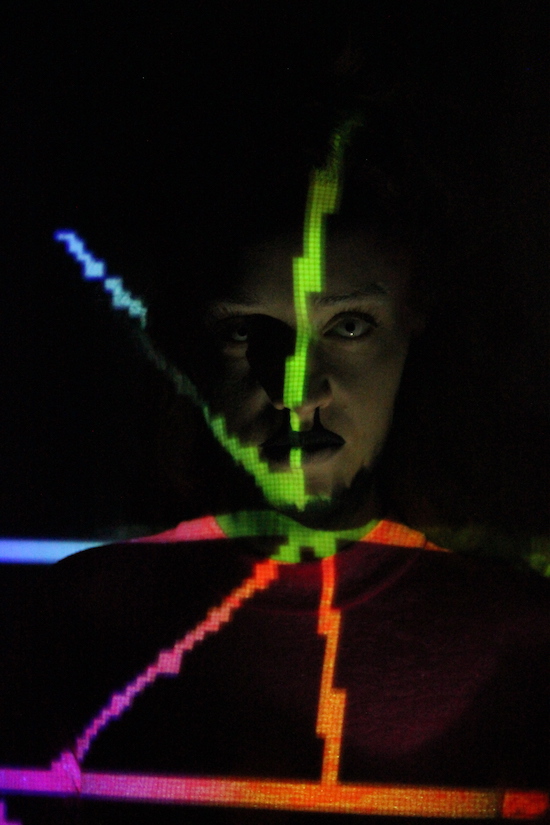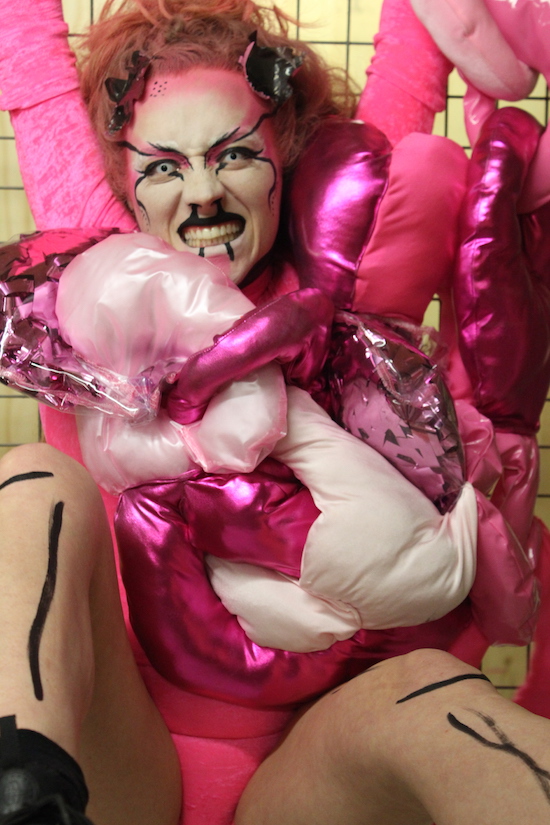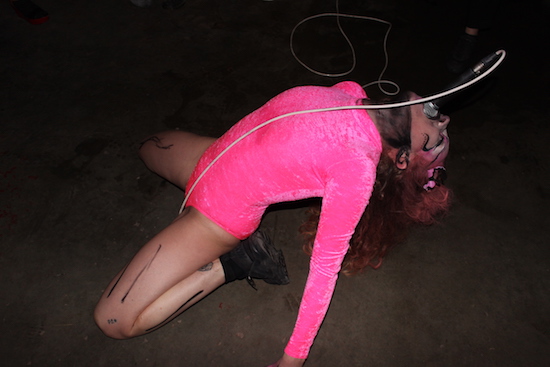All photographs by Noura Ikhlef
The history of noise music’s many subsidiaries can be a divisive one. As well as holding some of the most transgressive artists in living memory, it has a bad habit of becoming homogeneous. An underlying toxic masculinity fuels this habit. During the late 90s and early 2000s a lot of noise music felt like mere muscle flexing – it became a field driven by distortion-drenched shock factor. This quest to prove ‘whose balls were the biggest’ proved to be as diabolical as you’d expect, the oversaturation of machismo within the genre lead to some emotionally robust music, that was, quite frankly, boring.
The turn of the decade has twisted this trajectory. The music of Moor Mother, Pharmakon and Puce Mary, sets a post-industrial landscape that is slightly less infested with male mediocrity. Nottingham-based sound and performance artist Aja further illustrates this. She’s the antithesis of the macho tropes that have for years surrounded noise music. Falling somewhere under the umbrella of ‘New Weird Britain’, her live shows symptomatic of it. Built upon the idea of audience immersion, Aja beckons you to share the extreme emotion her performances convey and the strangeness that surrounds it.
Performing at Down Lane Studios, a venue situated on an industrial estate in Tottenham, Aja is curled up on the floor in a pink flamingo leotard screaming over a blend of power electronics and industrial techno. It’s quite hard to believe that just a few years ago, Aja had been gaining traction on the BBC whilst making music in the vein of Katy B. However, this isn’t a period in her career that Aja looks back on with fondness. She’d been interested in groups like Aids Wolf from an early age, but felt pressure to make a certain kind of music. “I had a big phase of not being myself, I didn’t have the guts to defy people’s expectations!”
Defying expectations is exactly what Aja does now, meeting her in person, she couldn’t be further from the otherworldly creature that you’ll see in her performance. She’s warm and approachable. I recall Aja chatting to a 10-year-old girl (who was quite bewildered on being at the event) a few hours before her performance in Tottenham for a good 20 minutes. This interaction was perhaps a testament to her work outside of performing; Aja runs Ableton workshops for young girls who want to experiment with sound. She also uses this platform to promote discussions about taboo issues: “I try to open up conversations, about mental health and my experiences – and how music and performance has helped”.

Catharsis is a big part of her music. She channels a plethora of intense emotions into her work: “I scream and I’m confrontational, but at the same time I do it out of love – and I want everyone to feel that”. In spite of this, Aja’s performances haven’t always been met with respect. “I don’t like the old-school macho side of the scene, and at times crowds have responded with a lot of disrespect and misogyny. For instance, people come into my space even after I push them away, playing with my equipment and laughing in my face when I’m performing naked”.
“When people are open and respectful, magical things can happen,” Aja recounts of her performance at Supernormal last year. “It was amazing, by the end everyone was hugging each other and crying – I wish it was always like that”.
Despite at first coming across as fierce, perhaps frightening, Aja’s work brings with it a sense of positivity. This positivity manifests itself is through a notable drag influence, the lead single from her debut album being entitled ‘Tuck It, Tape It’, an act which refers to hiding a penis and testicles with tape. She cites drag performance as a huge inspiration on the way she presents herself.
The vibrancy of drag also bleeds into Aja’s aesthetic, she co-designs her costumes with Berlin based designer Lu La Loop. “I’ll send over sketches to her and she’ll design them. They are inspired by a whole range of things; usually stemming from conversations we’ve had about things as disparate as biology, punk, nature and witchcraft.” The costumes can at times come out as a hybrid of all those ideas, they’re colourful, but they’re also quite frightening.
Aesthetically you could place Aja somewhere between Gazelle Twin, Fever Ray or even Arca, but sonically she’s something completely different. As well as being explicitly noisy, Aja’s live performances can also be beat-centric – she calls back to producer Andrew Course as a key perpetrator in Aja making the music she makes today. “He spent years and years teaching me everything I know about production, I don’t think I’d be doing what I’m doing now without him”.

Her live performance sheds light on a completely alternate, unleashed version of Aja. The amount of emotion she channels into the shows can be overwhelming. She isn’t trained in any instrument, which almost provides a flexibility in the way she approaches sound. Completely unchained from rules, she improvises 90% of her live set: “I play live I really need a sense of connection, and I can’t get from MIDI – I need the audience”. She goes on to tell me: “The sets can be completely different depending on what mood I’m in, and what costume I’m wearing. I love it because it gives me time to connect with the people who are watching me and explore the environment I’m in. It’s just impossible to translate that into recorded material because it’s just so unique.”
Her upcoming self-titled debut will be her first physical release, but Aja has been providing vocals for a whole wealth artists over the years. Last year she appeared on Perc’s Bitter Music. “I remember getting sent the track and recording it in the studio” she says. “It was about 20 minutes of intense screaming before I just heard these loud bangs on the door, it was the people from next door saying they’d call the police. They thought I was getting murdered.”
Much like contemporaries Lone Taxidermist and Phantom Chips, Aja goes out of her way to make her performance audience interactive. She’s in the midst of creating a 360° music video and a virtual reality project in the vein of Bjork Digital In partnership with the University of Nottingham; she’s creating a world in which people can interact with virtual surroundings to add to the music. Over the past few months, she’s performed at Edited Arts’ tribute to the Radiophonic Workshop and and a Throbbing Gristle photo exhibition in Belper – events that Aja seems humbled to be involved with. Her presence on these bills adds a sense of vibrancy, which is clearly very much welcomed.
AJA is out now on Opal Tapes


